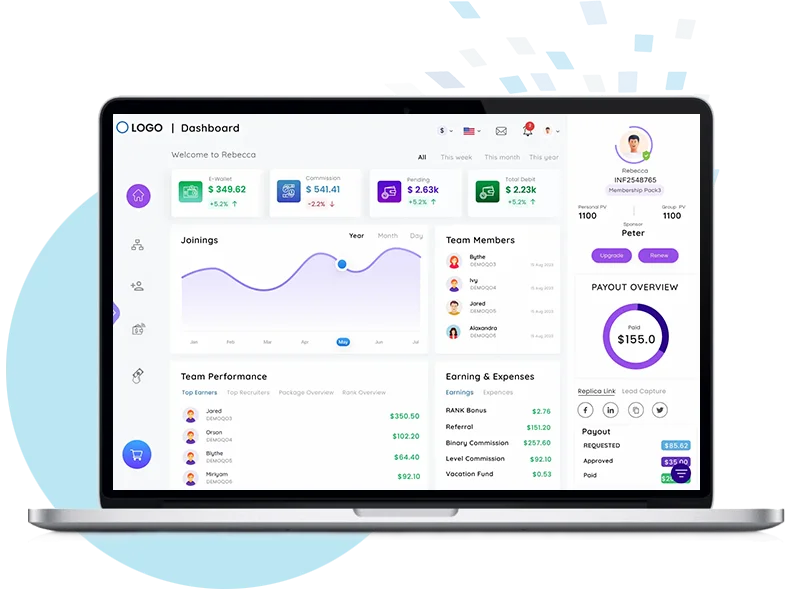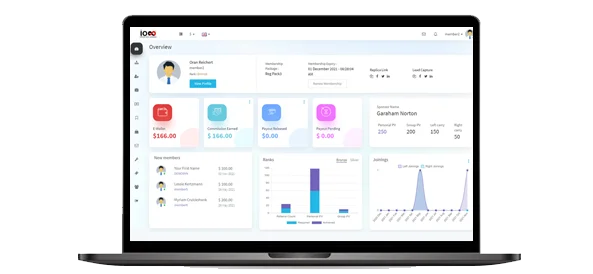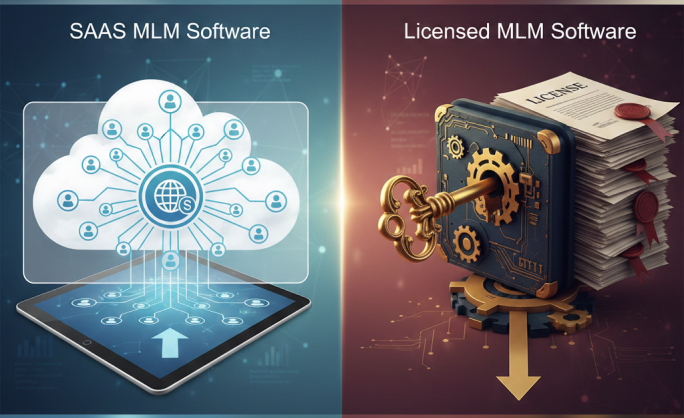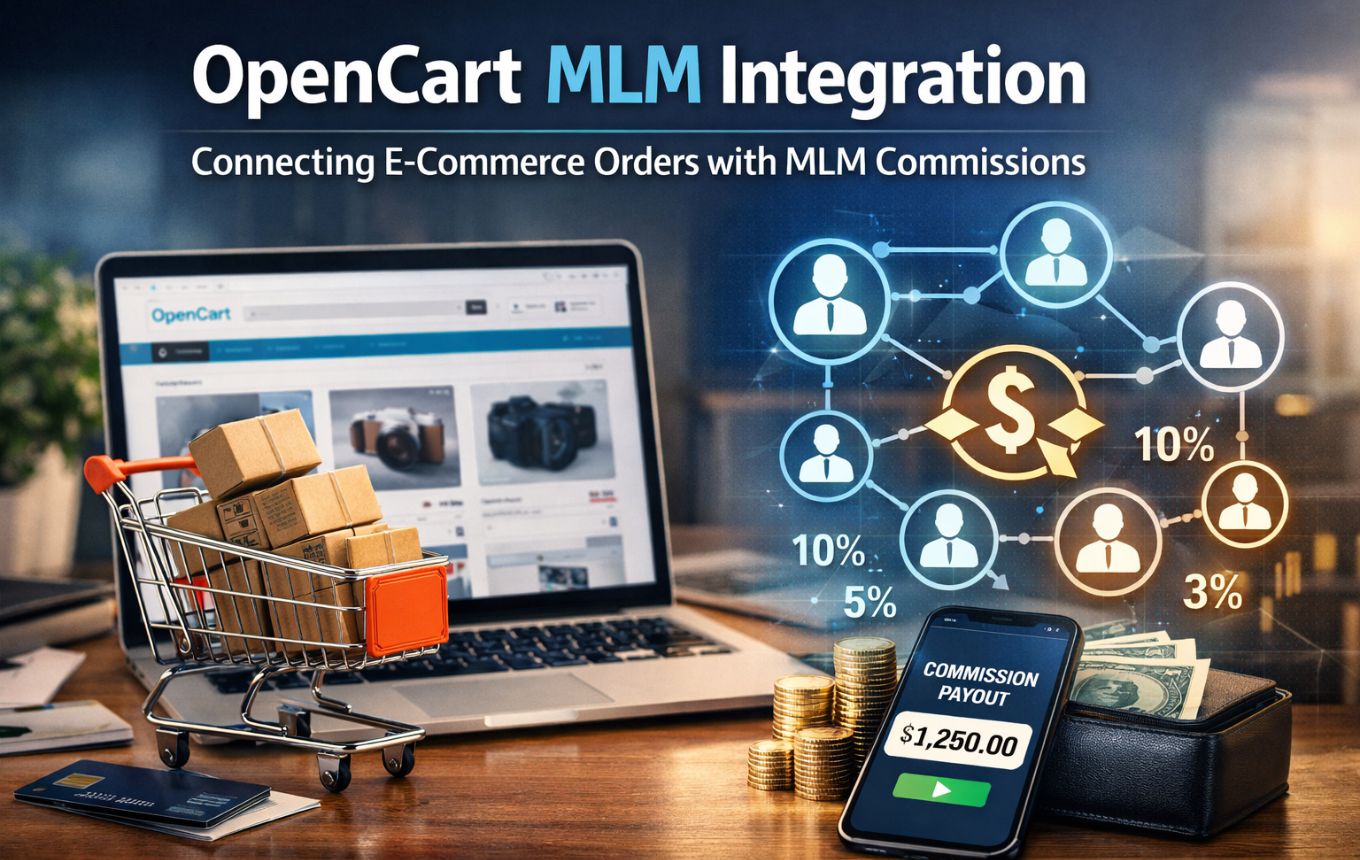Imagine trying to build an MLM business without proper lead management strategies and customer management. Sounds impossible, isn’t it? This is similar to trying to build a house without a solid framework.
A good MLM software can help you with this. Why not try to get the best out of it? Hence, integrating business operations with a customer relationship management tool is of high importance and priority. This is where Salesforce MLM integration comes into place.
Salesforce is a CRM tool that can optimize your MLM customer data, drive sales, optimize efficiency, and achieve optimal growth.
This blog will guide you through the advantages, features, and process of integrating Salesforce with your MLM business. Buckle up to learn how this can help you simplify your direct sales operations and make your business more efficient.
What is Salesforce and Its Role in Network Marketing?
Salesforce is a cloud-based customer relationship management (CRM) platform that helps businesses manage their interactions with customers. It enables businesses to grow, find more prospects, close deals, and improve customer service. Salesforce is widely used by sales, support, and marketing teams for its robust features and user-friendly interface.
In network marketing, Salesforce makes it easier to connect with customers and partners. It helps track customer activities and automates tasks. The software also offers clear visual dashboards for data. Salesforce improves customer support and sales efforts. It’s a valuable tool for managing and growing a network marketing business.
Why Choose Salesforce MLM Integration for Your Business?
Designed for versatility, Salesforce caters to a wide range of industries, including MLM businesses where managing extensive networks of clients and distributors is crucial. With Salesforce MLM integration, businesses can easily manage and grow their multi-level marketing operations, ensuring that every aspect of their network is efficiently coordinated.

Sales Automation
Business operations often waste time on repetitive tasks like email marketing and lead nurturing. With Salesforce’s MLM lead management, tasks such as scheduling meetings, setting reminders, and sending follow-up emails are automated. This saves time and ensures no opportunities are missed when converting leads into customers.
Sales opportunities are tracked through the sales pipeline with automated updates, and pricing quotes and orders can be quickly generated and approved using workflows. Sales forecasting tools help predict future trends, while email integrations simplify communication with follow-ups, reminders, and AI templates.

Excellent Customer Service

Marketing Automation

Powerful Analytics

Retention Rate of Customers
Key Features of Salesforce MLM Integration in Network Marketing
Making use of a direct selling software with Salesforce can significantly enhance your network marketing operations by simplifying processes and improving overall efficiency.

Lead Management and Segmentation:
Salesforce MLM lead management begins with automatically capturing leads from sources like web, email, chat, calls, and other campaigns. Leads are then classified and prioritized using lead scoring based on their responses and preferences. Captured leads can be automatically assigned to sales and customer success reps based on predefined criteria. A continuous workflow tracks each lead’s journey from generation to successful conversion into a customer. This system also unifies customer data from various touchpoints, providing a complete view of each lead.
Example: If you manage a skincare company, you can segment leads into categories like “anti-aging enthusiasts,” “natural skincare users,” and “sensitive skin care seekers,” and tailor your campaigns accordingly.
Commission tracking:
Salesforce MLM makes it easy to visualize the complex hierarchies and compensation structures of your network marketing business. Real-time data on distributor performance and role-based sales activities can be used to manage incentives, payouts, and commissions effectively.
Example: If you have a multi-tiered network with different performance levels, Salesforce MLM can track the performance of each distributor and their team. If a distributor reaches a specific sales target, the system can automatically adjust their commission rate and trigger bonuses based on their role and achievements.

Customizable Dashboards and Reports:
Salesforce provides real-time, customizable dashboards and reports to track vital metrics such as lead conversion rates, sales performance, and customer engagement.
Example: A network marketer might create a dashboard that tracks the performance of different product lines, showing metrics like sales trends, customer feedback, and distributor performance over the last quarter.

Automated Workflows and Email Campaigns:
Workflow automation in Salesforce helps simplify repetitive tasks by setting up rules that trigger specific actions, like sending follow-up emails or assigning leads to team members.
Example: When a lead requests information about your product through a landing page, an automated workflow can immediately send a personalized thank-you email, follow up with additional resources after a few days, and notify a team member to reach out personally.

Integration with Social Media Platforms:
Salesforce integration with social media platforms allows you to track interactions, monitor brand mentions, and engage with prospects directly.
Example: A network marketer could integrate Salesforce with Facebook, automatically pulling in data from potential customers who have shown interest in a product, enabling timely and personalized follow-ups.

Mobile App for Productivity:
The Salesforce mobile app empowers marketers to access leads, update records, and collaborate with team members anytime, anywhere.
Example: While attending a trade show, a marketer can instantly add new leads into Salesforce using their mobile app, ensuring no potential contact is missed.

Lead Scoring and Prioritization:
Salesforce allows you to assign scores to leads based on their engagement levels, such as website visits or email clicks, to prioritize follow-up actions and enhance lead capture strategies.
Example: A lead who frequently visits your product pages and downloads informational guides might receive a higher score, prompting immediate and personalized outreach from your sales team.

Multi-Channel Communication:
Effective communication is key to success in network marketing. Salesforce supports communication across various channels, including email, chat, and phone, ensuring consistent and trackable interactions.
Example: After a potential distributor watches an informational video, you can follow up with a personalized email, then schedule a phone call to discuss their interest further.

Collaboration and Team Productivity:
Salesforce facilitates team collaboration by allowing members to share notes, assign tasks, and maintain transparency across all interactions.
Example: After a team member has a meeting with a potential lead, they can document key discussion points in Salesforce, ensuring the rest of the team is informed and aligned on next steps.

Third-Party App Integrations:
Salesforce’s ecosystem of third-party app integrations allows you to extend the platform’s capabilities to meet your unique business needs. Integrating it with third-party tools like marketing automation, analytics, or project management platforms.
Example: By integrating Salesforce with Slack, a network marketer can receive real-time notifications about lead activities, simplifying team communication and response times.

Training and Support Resources:
Salesforce offers a wealth of training materials, webinars, and a supportive community to help network marketers enhance their skills and stay up-to-date.
Example: A network marketer can take a course on advanced sales strategies, improving their ability to close deals and grow their network.
Step-by-Step Guide to Integrating Salesforce with MLM
By following these steps, you can achieve a successful Salesforce MLM integration, making use of CRM capabilities to simplify operations and drive growth in your network marketing business.

- Planning and Strategy: Evaluate your MLM needs and set clear goals for the Salesforce MLM integration. Involve key stakeholders to align the integration with your business requirements, such as improving lead management and optimizing sales processes.
- Choosing the Right Tools and Platforms: Select integration tools like Salesforce API, middleware solutions, or other integration tools for Salesforce based on compatibility with Salesforce and your budget. Ensure these tools support CRM integration and MLM software features, such as commission calculations,compensation plans and distributor hierarchies.
- Data Migration and Mapping: Transfer your MLM data to Salesforce using tools like Salesforce Data Loader. Map your existing data fields to Salesforce fields to maintain accuracy and consistency, ensuring smooth data synchronization and real-time data integration.
- Testing and Validation: Test the integration thoroughly to ensure it functions correctly. Validate data accuracy, test workflows, and collect user feedback. Make adjustments as needed to ensure a smooth implementation.
- User Training and Support: Train users on how to use Salesforce for MLM with proper training and support. Offer ongoing support to address issues and refine the integration based on feedback to enhance functionality and user experience.
Common Challenges in Salesforce MLM Integration
Data Security and Privacy:
Integration of Salesforce with MLM software can expose sensitive data to security threats, including unauthorized access or data breaches.
Best Practices: Prioritize data security by implementing strong encryption, secure authentication methods, and regular security audits to protect data.
Technical Complexity:
Integrating Salesforce with MLM software can involve complex technical issues.
Solutions: Seek expert support to address technical challenges and ensure smooth integration. Utilize professional services to manage complex configurations and troubleshoot issues.
Change Management:
Users may resist adopting new systems or changes in workflow while integrating Salesforce with MLM software.
Solutions: Prioritize training and communication to facilitate user adoption and minimize resistance. Involve users early in the process to address concerns and gather feedback.
Cost of Integration:
MLM integration with Salesforce costs can vary based on the scope of integration, tools used, and required customizations.
Considerations: Develop a clear budget, considering both initial setup costs and ongoing maintenance. Factor in potential additional costs for training and support.
Best Practices for Salesforce MLM Integration
Clear Goal Setting:
Define clear objectives for the integration to ensure alignment with business needs and expectations. Establish measurable goals to guide the integration process and evaluate success.
Data Mapping and Management:
Ensure consistent and accurate data flow by thoroughly mapping existing data fields to Salesforce fields. Regularly review and manage data to maintain integrity throughout the integration.
Security Protocols:
Implement security measures during integration, including encryption and secure access controls, to safeguard sensitive data and maintain privacy.
Continuous Monitoring and Updates:
Ongoing monitoring and updates are essential to maintain system performance and address any issues that arise post-integration. Regularly review and optimize the integration to keep up with evolving business needs.
Conclusion
Integrating Salesforce with your MLM business isn’t just a strategic move – it’s a game-changer. By utilizing Salesforce CRM capabilities, you can transform your network marketing operations, turning complex processes into efficient systems. From automating lead management to enhancing customer service and providing powerful analytics and reporting, Salesforce MLM integration delivers the tools needed to elevate your business.
Embracing Salesforce MLM integration means setting yourself up for sustained growth and improved efficiency. It’s about working smarter, not harder, and ensuring every aspect of your direct sales operation is aligned and optimized. As you begin on this journey, remember that the initial challenges are just stepping stones to achieving more agile, responsive, and successful MLM companies. Dive in, explore the potential, and watch how Salesforce transforms your network marketing efforts into a powerhouse of productivity and growth.
Frequently Asked Questions
Salesforce MLM integration refers to the process of connecting Salesforce’s CRM platform with Multi-Level Marketing (MLM) systems to simplify operations, manage leads, and enhance overall business efficiency.
It improves efficiency by lead generation and management, enhancing customer service, providing powerful analytics, and centralizing data, which helps simplify complex MLM processes and improve decision-making.
Key challenges include ensuring data compatibility, managing the complexity of MLM structures, addressing potential integration issues, and customizing the integration to fit specific business needs.
The best marketing tool to integrate with Salesforce often depends on your specific business needs, but popular choices include HubSpot, Marketo, and Pardot, which offer features for lead management and marketing automation.










